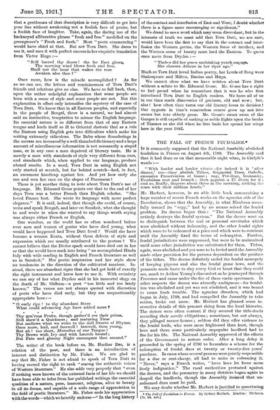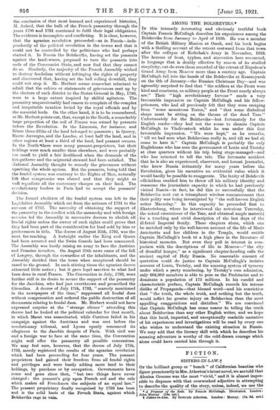THE FALL OF FRENCH FEUDALISM.*
Is IS commonly supposed that the National Asseinbly abolished feudalism in France on August 4th, 1789. The Assembly said that •it had done so •on that memorable night when, in Carlyle's words :-
" With louder and louder vivats--for indeed it is ' after
dinner,' too they abolish Tithes, Seignorial Dues, Gabelle, excessive Preservation of Game ; nay, Privilege, Immunity, Feudalism root and branch ; then appoint a Te Deum for it ; and so, finally, disperse about three in the morning, striking the stars with their sublime heads."
Mr. Herbert, however, in an able little book summarizing a large number of recent French works on the agrarian side of the Revolution, shows that the Assembly, in what Mirabcau scorn- fully termed its " orgy," had by no means solved the feudal problem. Its decree began thus : "The National Assembly entirely destroys the feudal system." But the decree went on to distinguish between the real or personal servitudes which were abolished without indemnity, and the other feudal rights which were to be redeemed at a price and which were to continue until the Assembly fixed the terms of redemption. Further, feudal jurisdictions were suppressed, but were to be maintained until some other jurisdiction was substituted for them. Tithes, again, were abolished and yet were to be levied until the Assembly made other provision for the persons dependent on thc'produce of the tithes. The decree definitely ended the feudal monopoly of keeping pigeons and also the feudal game laws, and the peasants made haste to slay every bird or beast that they could see, much to Arthur Young's discomfort as he journeyed through Provence and came under the fire of these rustic sportsmen. In other respects the decree was absurdly ambiguous—for feudal- ism was abolished and yet was not abolished, and it was bound to cause fresh trouble. The agrarian disorders; which had begun in July, 1789, and had compelled the Assembly to take action, broke out anew. Mr. Herbert has gleaned some in- structive details of this peasant rising from the local histories. The rioters were often content if they secured the title-deeds recording their servile obligations ; sometimes, but not always, they pillaged manor-houses ; seldom did they offer violence to the feudal lords, who were more frightened than hurt, though here and there some particularly unpopular• landlord had to flee for his life. The National Assembly approved of the efforts of the Government to restore order. After it long delay it proceeded in the spring of 1790 to formulate a scheme for the redemption of feudal dues at twenty or twenty-five years' purchase. In cases -where several persons were jointly responsible for a due or rent-charge, all had to unite in redeeming it. " Never," says a, French writer, "have laws let loose more lively indignation." The rural authorities protested against the decrees, and the peasantry -in many clistrictebegam again to despoil the landlords, though the Assembly insisted that ure
redeemed dues must be paid.
We may doubt-whether-Mr. Herbert is justified in questioning • The Fall of .Feudaliare, in Franca. By Sydney Herbert. London Idethucn. [7s. Bd. net.]
tho conclusion of that most learned and experienced historian, M. Aulard, that the bulk of the French peasantry through the years 1790 and 1791 continued to fulfil their legal obligations.
The evidence is incomplete and conflicting. It is clear, however, that the agrarian revolution proceeded—as in Russia—inde- pendently of the political revolution in the towns and that it could not be controlled by the politicians who had perhaps started it. In Russia the Bolsheviks, having set the peasants against the landowners, proposed to turn the peasants into serfs of the Communist State, and now find that they cannot do so. Similarly, the majority of the French Assembly wished to destroy feudalism without infringing the rights of property and discovered that, having set the ball rolling downhill, they could not stop it. Mr. Herbert seems somewhat reluctant to admit that the cahiers or statements of grievances sent up by the electors of each district to the States General in May, 1789, wore to a large extent inspired by skilful agitators. The peasantry unquestionably had reason to complain of the complex and inequitable taxation levied by the royal officials and by the manorial lords. On the other hand, it is to be remembered, as Mr. Herbert points out, that, except in the North, a remarkably large proportion of the soil of France was osined by peasants before the Revolution. In the Limousin, for instance, and Beam three-fifths of the land belonged to peasants ; in Quercy, Haute Auvergne, and the Landes, at least half the land, and in other regions at least a third of the land, had peasant owners. In the North•there were many peasant-proprietors, but their holdings were much smaller than elsewhere, and were probably too small to yield a fair livelihood when the demands of the tax-gatherer and the seignorial steward had been satisfied. The National Assembly thought to remedy the grievances without upsetting the whole system. But the peasants, being told that the feudal system was contrary to the Rights of Man, naturally felt that compromise was absurd and that they might as well repudiate all the customary charges on their land. The revolutionary leaders in Paris had to accept the peasants' decision.
The formal abolition of the feudal system was left to the Legislative Assembly which sat from the autumn of 1791 to the autumn of 1792. The necessity of obtaining the support of the peasantry in the conflict with the monarchy and with foreign enemies led the Assembly in successive decrees to abolish all feudal rights unless the owner of such rights could prove that they had been part of the consideration for land sold by him or predecessors in title. The decree of August 25th, 1792, was the most far-reaching. A fortnight earlier the King and Queen had been arrested and the Swiss Guards had been massacred. The Assembly was busily raising an army to face the Austrian and Prussian invaders. On August 25th news came of the fall of Longwy, through the cowardice of the inhabitants, and the Assembly decided that the town when recaptured should be razed to the ground. In such stirring times the agrarian decree attracted little notice ; but it gave legal sanction to what had been done in rural France. The Convention in July, 1793, went further still in its desire to secure the support of the peasantry for the Jacobins, who had just overthrown and proscribed the Girondins. A decree of July 17th, 1793, " scarcely mentioned in the newspapers of the time," suppressed all feudal dues without compensation and ordered the public destruction of all documents relating to feudal dues. Mr. Herbert would not have expressed surprise at the " strange silence " attending this decree had he looked at the political calendar for that month, in which Marat was assassinated, while Custines failed in his- campaign against the Austrians and was sent before the revolutionary tribunal, and Lyons openly renounced its allegiance to the Jacobin despots of Paris. With civil war and a foreign war to face at the same time, the Convention might well offer the peasantry all possible concessions. We may feel sure, however, that the decree of July 17th, 1793, merely registered the results of the agrarian revolution which had been proceeding for four years. The peasant proprietors had gained their freedom from all feudal rights and privileges and were busily adding more land to their holdings, by purchase or by occupation. Governments have come and gone since then, " but two things have never changed : the peasant's grip upon French soil and the rule which makes all Frenchmen the subjects of an equal law." The peasant proprietary finally recognized by 1793 has been and is the solid basis of the French State, against which Bolsheviks rage in vain.



































 Previous page
Previous page